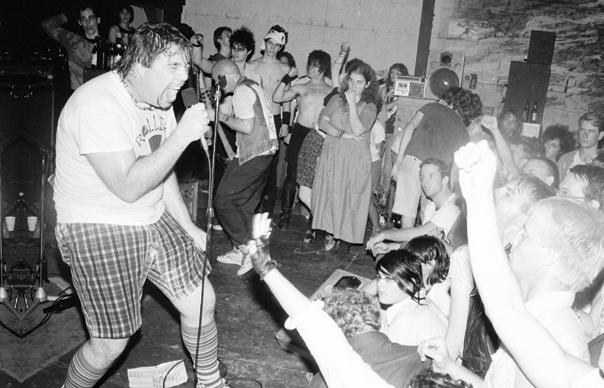Texas' idealistic, punk/funk avatars finally get their due: "Now go start your own band!" A whirlwind of artistic fearlessness, rugged individualism, and community spirit guiding the Austin punk scene 1979-1985, the big-hearted Big Boys were outrageous and eclectic, risk-takers espousing an anything-goes creative fervor that forged its own path. They resisted pigeonholes from the get-go, a kaleidoscope of thick, hard rhythms and ideas coming at you from all directions, fast. On stage, led by singer and force-of-nature Randy “Biscuit” Turner (1949-2005), they were a riot. Whether appearing in a tutu or leaning into a radical, think-for-yourself lyric Turner was the living embodiment of the freedom the band espoused. Together with guitarist Tim Kerr, bassist Chris Gates, and drummer Rey Washam, the group delighted, and confounded. “The scene at that time was made up of colorful characters and bigger than life personalities," remembers Kerr, now a respected artist and producer, " Biscuit was just another crazy bright light in a bunch of crazy lights, maybe a bit more Dada-bright than the others.” Apoplectically, they melded influences from Kool And The Gang to Throbbing Gristle ("We listened to it all," says Kerr), from swinging, stutter-step funk, with horns, to pissed-off, 30-second gut-punches. They were touring legends, but alas, tragically under-recorded in a cosmic-cowboy town. For his part, says Kerr, “I found freedom in the idea that, at least in Austin, this 'new thing' had no rules, no uniform. It was wide open to try anything.” These two albums, produced by Spot (Husker Du, Misfits), reflect it all, flying shrapnel of defiance that acts from Scratch Acid to Red Hot Chili Peppers readily embraced. Cafeteria is boiling with funk overtures ("What's the Word"), ragged pop (the Replacements on a bender "Which Way To Go"), and time-signature weirdness ("Killing Time"). Lullabies hews closer to their fire, its anthem "We're Not in It to Lose" throwing down the gauntlet—to avoid groupthink, creeping repression. "The cultural tension becomes fun," Kerr observes, "when you're not alone in the fight for self-expression. I think we all felt strongly about getting others involved. Or at least showing that there were other choices available. I still do." Luke Torn Credit: Courtesy of Pat Blashill
Texas’ idealistic, punk/funk avatars finally get their due: “Now go start your own band!”
A whirlwind of artistic fearlessness, rugged individualism, and community spirit guiding the Austin punk scene 1979-1985, the big-hearted Big Boys were outrageous and eclectic, risk-takers espousing an anything-goes creative fervor that forged its own path. They resisted pigeonholes from the get-go, a kaleidoscope of thick, hard rhythms and ideas coming at you from all directions, fast.
On stage, led by singer and force-of-nature Randy “Biscuit” Turner (1949-2005), they were a riot. Whether appearing in a tutu or leaning into a radical, think-for-yourself lyric Turner was the living embodiment of the freedom the band espoused. Together with guitarist Tim Kerr, bassist Chris Gates, and drummer Rey Washam, the group delighted, and confounded. “The scene at that time was made up of colorful characters and bigger than life personalities,” remembers Kerr, now a respected artist and producer, ” Biscuit was just another crazy bright light in a bunch of crazy lights, maybe a bit more Dada-bright than the others.”
Apoplectically, they melded influences from Kool And The Gang to Throbbing Gristle (“We listened to it all,” says Kerr), from swinging, stutter-step funk, with horns, to pissed-off, 30-second gut-punches. They were touring legends, but alas, tragically under-recorded in a cosmic-cowboy town. For his part, says Kerr, “I found freedom in the idea that, at least in Austin, this ‘new thing’ had no rules, no uniform. It was wide open to try anything.”
These two albums, produced by Spot (Husker Du, Misfits), reflect it all, flying shrapnel of defiance that acts from Scratch Acid to Red Hot Chili Peppers readily embraced. Cafeteria is boiling with funk overtures (“What’s the Word”), ragged pop (the Replacements on a bender “Which Way To Go”), and time-signature weirdness (“Killing Time”). Lullabies hews closer to their fire, its anthem “We’re Not in It to Lose” throwing down the gauntlet—to avoid groupthink, creeping repression.
“The cultural tension becomes fun,” Kerr observes, “when you’re not alone in the fight for self-expression. I think we all felt strongly about getting others involved. Or at least showing that there were other choices available. I still do.”
Luke Torn
Credit: Courtesy of Pat Blashill



